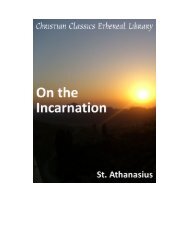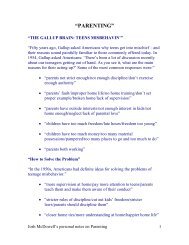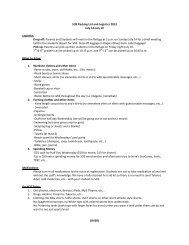Pdf Copy of Orthodoxy, by G.K. Chesterton - Christ United Methodist ...
Pdf Copy of Orthodoxy, by G.K. Chesterton - Christ United Methodist ...
Pdf Copy of Orthodoxy, by G.K. Chesterton - Christ United Methodist ...
You also want an ePaper? Increase the reach of your titles
YUMPU automatically turns print PDFs into web optimized ePapers that Google loves.
9/ 27/ 12 The Pr oject G ut enber g eBook <strong>of</strong> O r t hodoxy, G . K. Chest er t on<br />
www. gut enber g. or g/ f iles/ 16769/ 16769- h/ 16769- h. ht m<br />
tradition; it seems evident to me that they are the same idea. We will have the dead at our<br />
councils. The ancient Greeks voted <strong>by</strong> stones; these shall vote <strong>by</strong> tombstones. It is all quite<br />
regular and <strong>of</strong>ficial, for most tombstones, like most ballot papers, are marked with a cross.<br />
I have first to say, therefore, that if I have had a bias, it was always a bias in favour <strong>of</strong><br />
democracy, and therefore <strong>of</strong> tradition. Before we come to any theoretic or logical beginnings<br />
I am content to allow for that personal equation; I have always been more inclined to believe<br />
the ruck <strong>of</strong> hard-working people than to believe that special and troublesome literary class<br />
to which I belong. I prefer even the fancies and prejudices <strong>of</strong> the people who see life from<br />
the inside to the clearest demonstrations <strong>of</strong> the people who see life from the outside. I would<br />
always trust the old wives' fables against the old maids' facts. As long as wit is mother wit it<br />
can be as wild as it pleases.<br />
Now, I have to put together a general position, and I pretend to no training in such things. I<br />
propose to do it, therefore, <strong>by</strong> writing down one after another the three or four fundamental<br />
ideas which I have found for myself, pretty much in the way that I found them. Then I shall<br />
roughly synthesise them, summing up my personal philosophy or natural religion; then I shall<br />
describe my startling discovery that the whole thing had been discovered before. It had been<br />
discovered <strong>by</strong> <strong>Christ</strong>ianity. But <strong>of</strong> these pr<strong>of</strong>ound persuasions which I have to recount in<br />
order, the earliest was concerned with this element <strong>of</strong> popular tradition. And without the<br />
foregoing explanation touching tradition and democracy I could hardly make my mental<br />
experience clear. As it is, I do not know whether I can make it clear, but I now propose to<br />
try.<br />
My first and last philosophy, that which I believe in with unbroken certainty, I learnt in the<br />
nursery. I generally learnt it from a nurse; that is, from the solemn and star-appointed<br />
priestess at once <strong>of</strong> democracy and tradition. The things I believed most then, the things I<br />
believe most now, are the things called fairy tales. They seem to me to be the entirely<br />
reasonable things. They are not fantasies: compared with them other things are fantastic.<br />
Compared with them religion and rationalism are both abnormal, though religion is<br />
abnormally right and rationalism abnormally wrong. Fairyland is nothing but the sunny<br />
country <strong>of</strong> common sense. It is not earth that judges heaven, but heaven that judges earth; so<br />
for me at least it was not earth that criticised elfland, but elfland that criticised the earth. I<br />
knew the magic beanstalk before I had tasted beans; I was sure <strong>of</strong> the Man in the Moon<br />
before I was certain <strong>of</strong> the moon. This was at one with all popular tradition. Modern minor<br />
poets are naturalists, and talk about the bush or the brook; but the singers <strong>of</strong> the old epics<br />
and fables were supernaturalists, and talked about the gods <strong>of</strong> brook and bush. That is what<br />
the moderns mean when they say that the ancients did not "appreciate Nature," because they<br />
said that Nature was divine. Old nurses do not tell children about the grass, but about the<br />
fairies that dance on the grass; and the old Greeks could not see the trees for the dryads.<br />
But I deal here with what ethic and philosophy come from being fed on fairy tales. If I were<br />
describing them in detail I could note many noble and healthy principles that arise from them.<br />
There is the chivalrous lesson <strong>of</strong> "Jack the Giant Killer"; that giants should be killed because<br />
they are gigantic. It is a manly mutiny against pride as such. For the rebel is older than all the<br />
kingdoms, and the Jacobin has more tradition than the Jacobite. There is the lesson <strong>of</strong><br />
"Cinderella," which is the same as that <strong>of</strong> the Magnificat—exaltavit humiles. There is the<br />
26/ 100





